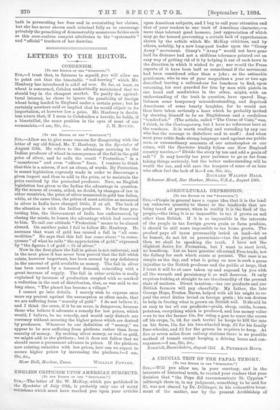ENGLISH CRITICISM UPON AMERICAN SUBJECTS.
[TO THE EDITOR OF THE " SPECTLTOR."]
SIR,—The letter of Mr. W. McKay, which you published in the Spectator of July 28th, is probably only one of many criticisms which must have reached you upon your articles upon American subjects, and I beg to call your attention and that of your readers to one trait of American character,—a more than tolerant good humour, just appreciation of which may go far toward preventing a certain lack of apprehension shown by the article which Mr. McKay criticises, and by others, notably, by a now long-past leader upon the " Ooxey Army " movement. Coxey's "Army " would not have gone half its distance had not a shiftless tolerance pointed out an easy way of getting rid of it by helping it out of each town in the direction in which it wished to go ; nor would the Press reports of it have been half so sensational if the movement had been considered other than a joke ; so the estimable gentleman, who in one of your magazines a year or two ago described leaving a railroad-car for luncheon to find, upon returning, his seat guarded for him by men with pistols in one hand and sandwiches in the other, might, with an understanding of the trait in question, have spared Eng.. lishmen some temporary misunderstanding, and deprived Americans of some hearty laughter, for he would not then have taken seriously a hoax which he probably invited by showing himself to be an Englishman and a credulous. " tenderfoot." (The article, called " The Curse of Cain," was, I think, in the Oontemporary, but I have no reference here at the seashore. It is worth reading and rereading by any one who has the courage to disbelieve and to scoff.) And when next your critic finds strong language used against our public men, or extraordinary accounts of our catastrophes or our crime, will the Spectator kindly follow our New England country maxim,—" Divide the story by ten and add a grain of salt"? It may heavily tax your patience to go so far frona taking things seriously, but the better understanding will bey worth the tax, and will save the tempers of some of us here- who often feel the lack of it.—I am, Sir, &c.,


































 Previous page
Previous page